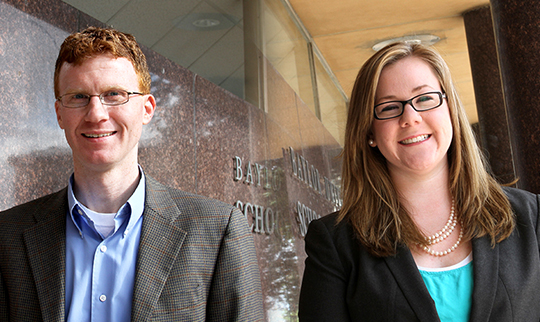Baylor School of Social Work receives grant to assess religion and spirituality in social work education

WACO, Texas (May 2019) — The Spencer Foundation recently awarded Baylor University’s Diana R. Garland School of Social Work (GSSW) a $50,000 grant to study if and how accredited Master of Social Work (MSW) programs incorporate curricula around religion and spirituality (RS) into social work education as well as assessing faculty views around the topic and how universities’ religious affiliations impact MSW education.
Assistant Professor Dr. Edward C. Polson and Associate Dean for Research and Faculty Development Holly K. Oxhandler are co-principal investigators for the study, entitled “Graduate Social Work Faculty Views on Preparing Students to Ethically Integrate Clients’ Religion/Spirituality in Practice: A National Survey”.
As of spring 2019, there were 290 MSW programs accredited by the Council on Social Work Education (CSWE), but little is known about how or if RS content is delivered within these colleges and universities.
“Given that social workers provide the largest proportion of mental healthcare services in the US [according to the Substance Abuse and Mental Health Administration], and clients have expressed a preference for integrating their RS in previous research, this is especially important to consider,” Oxhandler said. “In addition, no study has examined the potential impact religiously-affiliated colleges or universities have on MSW education, including preparing students to ethically integrate clients' RS.”
The research team, which will include a graduate assistant from the Garland School, will survey the approximately 5,000 full-time faculty across all of the CSWE-accredited MSW programs to answer three questions:
1) How do MSW programs prepare students to ethically integrate clients' RS in practice (if at all)?
2) What are MSW faculty members' views and behaviors related to educating students on RS in social work?
3) In what ways, if any, do colleges' /universities' religious affiliation impact training on CSWE competencies in MSW programs?
Given that social workers provide the largest proportion of mental healthcare services in the US [according to the Substance Abuse and Mental Health Administration], and clients have expressed a preference for integrating their RS in previous research, this is especially important to consider.
Over the last few decades, research has shown a growing awareness that RS plays an important role in Americans' lives and the ethical integration of clients' RS in mental health treatment often contributes to positive outcomes. A previous study by Oxhandler revealed social workers held overwhelmingly positive attitudes toward integrating RS into treatment, but few were engaged in the practice. The study indicated only two practitioner characteristics that could predict their orientation toward integrating clients' RS into treatment: intrinsic religiosity (the degree to which practitioners are internally motivated by RS) and prior training. This lack of training was reflected through surveys showing only 13% of social workers had taken a course in their MSW program. Further, in another study by Oxhandler and Baylor alumna, Kelsey Moffatt, the team found a mere 78 of 257 programs mentioned a course on RS on their school websites in 2018.
“We look forward to learning more about how MSW faculty across the US integrate religion and spirituality content into their MSW curricula as an element of clients’ culture and coping skills,” Oxhandler said. “Recognizing that clients tend to prefer their therapist assess and discuss the client’s spirituality as it relates to treatment, coupled with the fact that very few mental health care providers are trained in this area, we saw a need to better understand what's happening within MSW programs.”
The Spencer Foundation has been funding education research since 1971 and is the only national foundation focused exclusively on supporting education research. Their Small Research Grants on Education program supports research projects that will contribute to the improvement of education, and their goal is “to support rigorous, intellectually ambitious, and technically sound research.”
“I am truly grateful for the Spencer Foundation’s support for Dr. Polson and I to carry out this exciting project!” Dr. Oxhandler added.